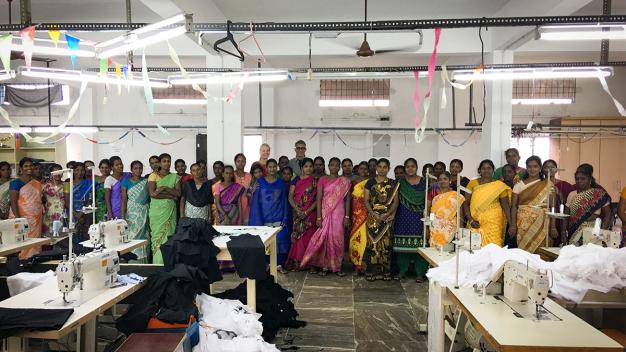A Supply Chain of Freedom: Made by Free Women
Let’s eradicate modern-day slavery once and for all.

There are nearly 46 million people in 167 countries living in some form of slavery today, and women and girls in developing nations make up more than 70 percent of those exposed to constant abuse and extreme poverty.
They can’t live freely or earn enough to meet basic needs for themselves or their families.
Let’s shine a light on one of the many women with stories to tell.
Meet Bavishni
Bavishni lives in rural India and grew up facing a lifetime of captivity. From a young age, she understood that, at best, she’d spend her teenage years and adult life in an apparel factory.
At worst, she’d be forced into a marriage … a practice internationally recognized as a form of sexual slavery. When she was 15, Bavishni’s father abandoned her and her four sisters, seemingly destroying any chance they had to make a better life for themselves.
A better path
But in 2015, Bavishni learned about a fashion organization that would change her life.
She started a job with a partner of CAUSEGEAR®, an international provider of fashion apparel and accessories. From her remote Indian village, Bavishni created goods for sale around the world.
CAUSEGEAR® isn’t a regular clothing company. Its mission is to provide opportunities through sustainable employment to people trapped in modern-day slavery or extreme poverty.
Brad and Katherine Jeffery founded the company after seeing this plight during their work and travels.
The company’s sourcing policy is already breaking the chains of poverty and generating economic opportunity where opportunities didn’t previously exist.
CAUSEGEAR® utilizes a 5X compensation system for the artisans that create the goods they sell. That means its supply chain starts with laborers making five times the typical wage in their local markets.
Does the system work?
Well, today, Bavishni is a young artisan providing for her family and offering a path of freedom for her four sisters and mother.
Jobs mean liberty
For free women like Bavishni, jobs mean liberty. She’s paid more than just a living wage, and the people that buy her high-quality wares get quality and value in their purchases.
Believe it or not, the 5X model remains affordable for the consumer.
Products appear alongside stories on their website. Statements quantifying days of freedom for the artisans behind the products are included in corporate and event orders.
Human justice in the supply chain
Change often starts at the grassroots level. But it must happen on a larger scale as well.
It isn’t just conscientious consumers making a difference. Sustainability and human rights are top-of-mind issues at today’s most successful businesses.
Corporations that source goods responsibly find meaningful ways to measure the impact of such practices. This approach influences perceptions, changes behaviors and supports positive corporate culture.
More companies – and their investors – are measuring success by how they impact the world around them. It’s time we all take a hard look at where we source our purchases – from the department store all the way up to the boardroom.
It’s good for business. But more importantly, it’s good for the Bavishnis of the world who will ride a supply chain of freedom to a better life.

